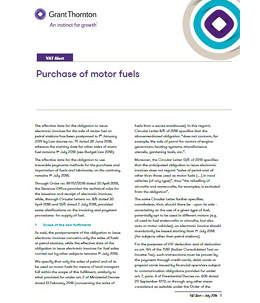-
Transactional advisory services
Find out more about the transactional advisory services of Grant Thornton Financial Advisory Services
-
Valuations
Find out more about the valuations services of Grant Thornton Financial Advisory Services
-
Mergers and acquisitions
Find out more about the merger and acquisition services of Grant Thornton Financial Advisory Services
-
Forensic and investigation services
Find out more about the forensic and investigation services of Grant Thornton Financial Advisory Services
-
Recovery & reorganisation
Find out more about the Recovery & reorganisation services of Grant Thornton Financial Advisory Services
-
Business risk services
Find out more about the business risk services of Grant Thornton Financial Advisory Services
-
Business consulting
Find out more about the business consulting services of Grant Thornton Financial Advisory Services
-
Capital market
Capital market
-
Corporate and business tax
Find out more about our corporate and business tax services.
-
Direct international tax
Find out more about our direct international tax services.
-
Global mobility services
Find out more about our global mobility services.
-
Indirect international tax
Find out more about our indirect international tax services.
-
Transfer pricing
Find out more about our transfer pricing services.
-
Litigation
Our lawyers and accountants can manage all defense measures provided not only by the Italian law, but also by EU regulations and conventions
-
Family business
Find out more about our Family business services.
-
Legal
The client can be assisted in every need and with the same care both on important operations or disputes and on simple matters

-
Back office outsourcing
Find out more about our Back office outsourcing services
-
Business process outsourcing
Find out more about our business process outsourcing services.
-
Compilation of financial statements
Find out more about our compilation of financial statements services.
-
Tax compliance
Find out more about our tax compliance services.
-
Electronic invoicing
Find out more about our electronic invoicing services
-
Electronic storage
Electronic storage is an archiving procedure that guarantees the legal validity of a digitally stored electronic document
-
Revaluation of corporate assets
Find out your civil and fiscal revaluation of tangible, intangible and financial assets
-
Human resources consulting
Find out more about our human resources consulting services.
-
Payroll
Find out more about our payroll services.
-
HR News
HR News the monthly information newsletter by Grant Thornton HR
-
Cybersecurity
GT Digital helps clients structure information security management internal functions, also through partially or totally outsourced functions
-
Agile and Programme Management
GT Digital provides support in the adoption and implementation of different portfolio management
-
Robotic Process Automation
Our “BOT Farm” can rely on digital workers able to help clients in routine activities, allowing employees to deal with more added-value activities
-
Data strategy and management
GT Digital can support clients in seizing the opportunities offered by Big Data, from the definition of strategies to the implementation of systems
-
Enterprise Resource Planning
We support clients in selecting the most appropriate ERP System according to their specific needs, helping them also understand licensing models
-
IT strategy
GT Digital supports clients in making strategic choices, identifying innovation opportunities, comparing themselves with competitors
-
IT service management
We can support with software selection and with the implementation of dedicated tools for the management of ICT processes
-
DORA and NIS 2
The entry into force of the DORA Regulation and NIS2 represents a major step towards the creation of a harmonised regulatory framework
The effective date for the obligation to issue electronic invoices for the sale of motor fuel at petrol stations has been postponed to 1st January 2019 by Law decree no. 79 dated 28 June 2018, whereas the starting date for other sales of motor fuel remains 1st July 2018 (see Budget Law 2018).
The effective date for the obligation to use traceable payments methods for the purchase and importation of fuels and lubricants, on the contrary, remains 1st July 2018.
Through Order no. 89757/2018 dated 30 April 2018, the Revenue Office provided the technical rules for the issuance and receipt of electronic invoices, while, through Circular Letters no. 8/E dated 30 April 2018 and 13/E dated 2 July 2018, provided some clarifications on the invoicing and payment procedures for supply of fuel.
Scope of the new fulfilments
As said, the postponement of the obligation to issue electronic invoices concerns only the sales of fuels at petrol stations, while the effective date of the obligation to issue electronic invoices for fuel sales carried out by other subjects remains 1st July 2018.
We specify that only the sales of petrol and oil to be used as motor fuels for means of land transport fall within the scope of this fulfilment, similarly to what provided for under art. 2 of Ministerial Decree dated 13 February 2018 (concerning the sales of fuels from a excise warehouse). In this regard, Circular Letter 8/E of 2018 specifies that the abovementioned obligation “does not concern, for example, the sale of petrol for motors of engine-generators, heating systems, miscellaneous utensils, gardening tools, etc.”.
Moreover, the Circular Letter 13/E of 2018 specifies that the anticipated obligation to issue electronic invoices does not regard “sales of petrol and oil other than those used as motor fuels (…) in road vehicles (of any type)”, thus “the refuelling of aircrafts and watercrafts, for examples, is excluded from the obligation”.
The same Circular Letter further specifies, nonetheless, that, should there be - upon its sale - uncertainty on the use of a given type of fuel, potentially apt to be used in different motors (e.g. oil used to fuel watercrafts or aircrafts, but also auto or motor vehicles), an electronic invoice should mandatorily be issued starting from 1st July 2018 (for subjects other than petrol stations).
For the purposes of VAT deduction and of deduction ex art. 164 of the TUIR (Italian Consolidated Text on Income Tax), such transactions must be proven by the payment through credit cards, debit cards or prepaid cards issued by financial operators subject to communication obligations provided for under art. 7, para. 6 of Presidential Decree no. 605 dated 29 September 1973, or through any other mean considered as suitable under the Order of the Director of the Revenue Office[1]”.
Such Order, complementing the provisions under para. 922 and 923 of Law no. 205 of 2017[2], identifies the following “traceable” means of payment:
- bank and postal cheques;
- Central bank promissory notes and post office money orders[3];
- electronic means[4], such as:
- direct debit;
- bank or postal transfers;
- postal paying-in slips;
- debit, credit and prepaid cards;
- other available electronic payment methods, which also allow direct debit.
As indicated in Circular Letter no. 8/E of 2018, also if an employee purchases petrol or oil for corporate cars paying with his/her own debit/credit/prepaid card (or any of the abovementioned payment methods), the employer can deduct the relevant costs, provided that reimbursement of such costs is due to the employee and paid through a traceable method, such as a bank transfer.
Other traceable payment methods allowing to link an expense to a specific subject include cards, smartphone and tablet apps, electronic devices and similar methods, provided by industry operators, which allow to pay fuel through direct debit on the buyer’s bank account or credit card, either at the same time of the purchase or later. Also in this case, Circular Letter no. 8/E of 2018 states that the traceability of payments allows cost deduction.
The postponed entry into force of the obligation to issue electronic invoices, on the one hand, and the confirmation on the deductibility of the relevant VAT using traceable payment methods (as mentioned above), on the other hand, allow to continue using the “scheda carburante” to certify said purchases up to 31st December 2018, although this will become an unnecessary fulfilment, as specified under Assonime[5] Circular Letter no. 17 dated 6 July 2018.
Fuel cards
Particular payment means are fuel cards and fuel vouchers, used in so-called netting agreements: such agreements allow the use of the above payment tools, provided that they were charged through one of the abovementioned traceable methods.
However, it is necessary to distinguish between single-purpose or multi-purpose cards and vouchers.
A single-purpose voucher is issued by an oil company to be used at their branded petrol stations, managed directly by the oil company; in this case, refuelling is considered as performed at the moment of sale/refill of the card.
On the contrary, when the card/voucher can be used to refuel from different providers (so-called “no logo” stations)[6], or to purchase different goods or services, thus being similar to a multi-purpose voucher, it must be considered as mere money , not subject to VAT. The relevant invoice, also in electronic form, will have to be issued when the card/voucher is used to purchase petrol and oil.
Invoice data
Should an electronic invoice be issued, also through the simplified procedure[7], it must indicate mandatorily identification data of the seller and of the purchaser, including their VAT number or the VAT identification number of the buyer established[8] in Italy.
Data relevant to the motor vehicle that is refuelled do not mandatorily have to be indicated. However, the recently updated technical specifications on the issuance of invoices point out that the plate number of vehicles can be included in the section <AltriDatiGestionali>, unlike what indicated in the Order dated 30/04/2018. Though this is an option, we suggest to opt for.
[1] Ref. to Order no. 73203/2018 dated 4 April 2018, by the Director of the Revenue Office.
[2] Said paragraphs indicated the following as methods allowing to deduct fuel costs for income taxes and VAT purposes: “credit cards, debit cards or prepaid cards issued by financial operators subject to communication obligations”, as well as any “other means considered as suitable under an Order by the Director of the Revenue Office”.
[3] Bank cheques and promissory notes are defined under Royal Decree no. 1736 dated 21 December 1933, while postal cheques and post office money orders are defined under Presidential Decree no. 144, dated 14 March 2001.
[4] Ref. to art. 5 of Legislative Decree no. 82 dated 7 March 2005 and to the guidelines issued by the Agency for Digital Italy (AgID) dated 22 January 2014, no. 8/2014, point 5.
[5] Ref. to Assonime Circular Letter no. 17 dated 6 July 2018, para. 4.2: “Further to the provisions of Budget Law 2018 introducing the obligation to pay fuels with traceable means, effective from 1st July 2018 –(…) the purchase and use of a fuel card for VAT and income tax deduction purposes is currently unnecessary”.
[6] The same applies to vouchers issued by an oil company valid for refuelling at fuelling stations with the same brand, but not directly managed by the oil company.
[7] Ref. to articles 21 and 21-bis of Presidential Decree no. 633 of 1972.
[8] With Council implementing decision(EU) 2018/593 dated 16 April 2018, Italy has been authorised to introduce a special measure derogating from articles 2018 and 232 of Directive 2006/112/EC, in order to introduce the application of mandatory electronic invoicing on the whole Italian territory. Specifically, Italy was “authorised only to accept invoices in the form of documents or messages in an electronic format if they are issued by taxable persons established in the Italian territory (…).


